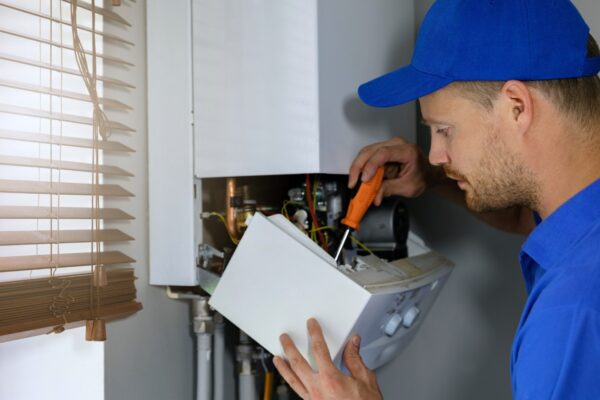Carbon monoxide and smoke alarms are necessary for keeping your tenants and property safe and preventing serious incidents.
Smoke alarms let people know early if there’s a fire, giving them valuable time to get out before the situation becomes life-threatening.
Carbon monoxide alarms are just as important. They pick up on this invisible, odourless gas that can leak from things like faulty boilers or stoves. Without an alarm, carbon monoxide can be deadly or cause serious illness, often with no warning signs at all.
In this blog post, we’ll guide you through the basics, from where alarms should be placed to how to keep them working properly and explain your responsibilities as a landlord.
- Do landlords have to provide smoke and carbon monoxide detectors?
- What type of alarm should you choose?
- Where should you install these alarms?
- Landlord and tenant obligations during the tenancy
- What are the penalties for landlords who fail to comply?
OpenRent is the cheapest and best way to advertise your rental property on the UK’s major property websites. Create Your Advert Today
Do landlords have to provide smoke and carbon monoxide detectors?
As a landlord, you’re legally required to make sure your property is fitted with the right alarms to keep your tenants safe.
The Smoke and Carbon Monoxide Alarm Regulations outline some key rules:
- There must be a smoke alarm on every storey of your property that’s used, even partly, as ‘living accommodation’
- You’ll also need a carbon monoxide alarm in any ‘living accommodation’ room with a fixed appliance that burns fuel, like a gas boiler or log burner. Gas cookers are an exception. Before 1st October 2022, this only applied to solid fuel appliances.
These rules have been in place for private landlords since 2015 and were extended to social landlords on 1st October 2022.
If your annual gas safety check finds a dangerous gas appliance, you need to make sure you let your tenants know and arrange for it to be disconnected straight away.
A few things to keep in mind:
- ‘Living accommodation’ includes bathrooms and toilets.
- ‘Rooms’ include spaces like halls and landings.
- Fixed appliances that burn fuel (like boilers or stoves) are covered under these regulations.
What type of alarm should you choose?
The regulations don’t specify which type of alarm you should use, so it’s a good idea to look into which ones best suit your property and the needs of your tenants.
Just remember, heat detectors aren’t a replacement for smoke alarms – you’ll still need to have proper smoke alarms installed.
When fitting alarms, always follow the manufacturer’s instructions to make sure they’re installed correctly and work as they should.
There are various options available, such as standalone smoke alarms, combined smoke and heat alarms, or even alarms that cover both smoke and carbon monoxide. Choose the best option to keep your property and tenants safe.
Under the Equality Act 2010, landlords are also required to make reasonable adjustments for tenants with disabilities. This may include providing specialist smoke or carbon monoxide alarms that use vibration or flashing lights.
You might also be interested in…
- All You Need to Know About Right to Rent Checks
- Guide to the Renters’ Rights Bill for Landlords 2025
- What Are the EPC Requirements for Landlords?
- Renting to Students: Guarantors, Advance Payments, HMO licence and more
- Holding Deposit, Tenancy Deposit, Rental Fees: Everything You Need to Know
Where should you install these alarms?
As a landlord, you have the flexibility to choose where to place alarms in your property, but it’s important to stick to the instructions provided by the manufacturer of the alarms you buy.
For smoke alarms, it’s best to fit them on the ceiling in a place where air circulates, such as a hall. For carbon monoxide alarms, they should be placed at head height, on a wall or shelf, and around one to three metres away from any potential source of the gas.
If you’re unsure about installation, you can always ask your local fire service for advice or visit the government’s website for more guidance.
Landlord and tenant obligations during the tenancy
As a landlord, you’re required to make sure all smoke and carbon monoxide alarms are working properly before a new tenant moves in, as part of your pre-tenancy checks.
If a tenant tells you that one of the alarms isn’t working, the latest regulations state you need to look into it and either fix or replace the alarm as soon as you can.
Tenants are responsible for testing the alarms regularly during their tenancy. If the alarms aren’t working, they may replace the batteries themselves.
If the alarm still isn’t working after changing the batteries, or if they’re unable to replace them, they should inform you, the landlord, so the issue can be addressed.
As mentioned earlier, the landlord must make sure that any faulty alarm is repaired or replaced as soon as reasonably possible after being notified.
Book your gas safety inspection today to meet your landlord obligations and protect your tenants.
Get Started
What tenancies do these regulations apply to?
These regulations apply to most residential properties in the private rented sector, including cases where the property is mixed-use, like a flat above a shop.
However, there are some exceptions where the Smoke and Carbon Monoxide Alarm Regulations don’t apply. These include:
- Resident landlords – If you live in the same property as your tenants, you’re not required to follow these rules.
- HMO landlords – If you’re renting out a House in Multiple Occupation, the HMO licence already requires you to install safety equipment.
- Long leases – Tenancies with a fixed term of seven years or more.
- Student halls of residence – There are government-approved guidelines that set minimum standards for smoke alarm installation and regular testing.
What are the penalties for landlords who fail to comply?
If a landlord doesn’t follow the rules, the local council can issue a penalty charge of up to £5,000.
They have the discretion to impose this charge, but if they do, they must send a notice within six weeks of finding a problem. Landlords can challenge the penalty notice, and the council might reduce the fine if it’s paid quickly.
For licensed properties (e.g., HMOs), not complying with the regulations is considered a breach of the mandatory conditions, which could lead to a civil penalty of up to £30,000.



